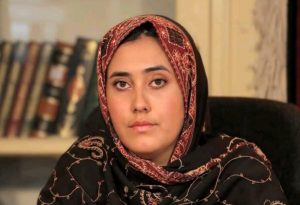Women Activists’ Narratives from Unknown Enemies; Taliban with a Different Identity or Others with Taliban’s Identity?

Ms. Durrani spent her childhood as an immigrant. She returned back to the country with her family as a teenager after the fall of the Taliban. Having completed her schooling in immigration, she was forced to complete her university studies through distance learning, due to security concerns. Maryam Durrani, now a well-known activist in the field of women’s rights in Kandahar, like any other citizen, has had fears and experiences of insecurity and violence at every moment of her life in the country. Ms. Durrani, who is in charge of a radio station called “Women” and supports several women’s organizations, says that since the beginning of their activities, she and her colleagues have experienced many threats and limitations. “Since our activities are related to women, we have been threatened several times so far. Our radio employees either receive threatening calls or are publicly and directly threatened in the streets and markets. “Sometimes, due to security problems, we are not allowed visit some areas.”
Ms. Durrani adds that in terms of security issues, what targets women, especially employed one’s is targeted assassinations, but she believes that these assassinations are not always carried out by the Taliban. “Assassinations cannot always be attributed to the Taliban. Some people carry out assassinations because of personal problems or rivalry with a person, but are ascribe to the Taliban.”, said Ms. Durrani. According to her, the opposite is not far-fetched either, and the Taliban may easily claim responsibility for the assassination, which is one of the serious problems of women activists in Kandahar because they are unable to recognize their true enemies.
She has survived two suicide bombings while working as a lawyer for the Kandahar Provincial Council. One of the most painful experiences of her career was the assassination of a colleague and a close friend, Ms. Sitara Achakzai. We were driving home and I arrived earlier than her. “Ten or fifteen minutes had passed since our farewell when they called me and informed me of her death.” Ms. Durrani says the incident has had a devastating effect on her mental state and remained as a warning forcing her to live in Kabul for four months.
“In 2014, I was seriously threatened by the Taliban,” said Maryam of another experience related to the activities of Radio Zan. “They wrote a petition calling for the radio to be shut down and summoned me to their court across the border in Pakistan. Because the Taliban never talk directly to a woman,” she added. “My father was asked to talk to them and answer their questions.”
She discussed the matter with the police chief, and found the liaison which caused the case to eventually end up in her favor.
In addition to the Taliban’s open opposition to Ms. Durrani’s radio activities, she has faced many difficulties in promoting these activities, and in one case she has been specifically targeted in this regard. In 2012, she received the International Award for Brave Women. Ms. Durrani says another major problem in some parts of Kandahar is the cultural structure of the community. According to her, in some cases, cultural misconceptions are more frightening to her than security threats, and such thinking has repeatedly obstructed the way for women activists in Kandahar. In her latest activities, she initiated a sport association for women in Kandahar. Unfortunately, some people including some of the religious scholars opposed to it. “One of the Mullahs called for the shutdown of the association in his Friday’s preaching, but fortunately they could not succeed to stop our activities.”
Aside from these issues, what Ms. Durani mentioned as promising in the women’s sector is the increase in the number of girls’ school and the improvement of their education level. Although, she does not consider it as sufficient and a guarantee for their further success.
Predicting the post-negotiation situation of women, she said that women may not be able to actively participate in society, the reason being the presence die-hard believers among the Taliban. However, over time, she said that they government’s efforts to gain their trust may change their views with regard to women.
Ms. Durrani concluded that preserving women’s rights to education and employment should the priority of peace negotiation, and women should continue their effort to access their unalienable rights.